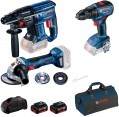Battery
The main properties of the battery used in the set devices. — Battery model. The information is relevant mainly for models without a battery included. For tools that come with batteries, the battery model is more of a reference—it's mostly "for the future" if a spare or replacement battery is needed.
— Complete battery. The number of batteries included in the kit. The most popular option for a complete set with a battery is 2 batteries. This provides additional advantages over single battery kits, which are especially useful for long continuous use of the tool. Some tools for the same reasons and due to the large number of devices can be equipped with three batteries and even four (especially in the case of simultaneous operation with two batteries). It is not very reasonable to produce battery packs without a battery, so there are only a few of them.
— Battery platform. Devices on the same platform use interchangeable batteries and chargers. This eliminates the need to select a battery for each individual power tool model. Batteries of the same platform basically differ from each other except for their capacity and, if necessary, you can buy a corresponding larger capacity.
— Battery voltage. Manufacturers select the battery voltage taking into account the performance characteristics of the tool and the power supply required to achieve these characteristics. In fact, this means that most often this parameter can be ignored at all when choosi...ng. Conventionally, 12 V devices can be described as household, and 18 V can already be attributed to industrial ones.
— Battery capacity. A higher battery capacity allows, other things being equal, the battery device to last longer. And if necessary, knowing the battery platform of the set, you can purchase an additional battery with a larger capacity.
Charging time
The time to fully charge the battery that the kit is equipped with from a standard charger (when using other batteries or a “non-native” charger, this time can vary both in one direction and in the other).
Additionally included
Additional kit may include:
— Charger. A regular charger with the necessary characteristics is designed for high-quality and proper charging of complete batteries. Included in almost all battery packs. The exceptions are small sets of low-power devices, which are more like an addition to the already existing power tools of the master.
— Case. Cases are containers made of rigid materials. Outwardly, the classic case resembles a suitcase, has a small height, when opened, it unfolds lengthwise into two halves, and the carrying handle, which is an indispensable element of the case design, is located on the side end. Thanks to this position of the handle and the flat shape, the cases are very convenient to carry in the hands, this option is preferred by many craftsmen who often have to move from place to place. Among the shortcomings of such models, one can only note the unsuitability for a large-sized tool — due to the mentioned small thickness.
— Box. Boxes are containers also made of rigid material, usually rectangular in shape, in which the bottom and 4 walls form an integral structure, and the lid (removable or folding) is located on top and is fixed with special locks. Boxes are mainly intended for storing tools in one place and carrying them over short distances (within the workshop or between the storage place and the machine); although most of these products are equipped with handles, they are not as convenient for long-term transportation in...the hands as cases. But of the advantages of the boxes, it is worth mentioning a good capacity and fairly reliable protection of the instrument from contact with surrounding objects and adverse effects (dust and moisture).
— A bag. Outwardly, tool bags tend to look like regular sports bags — most of them have a characteristic pair of handles and a shoulder strap. Such products combine the advantages of boxes and cases: on the one hand, they are quite roomy and suitable even for large items, on the other hand, they are easy to carry and much better than boxes, they are suitable for frequent movements on foot or by public transport. The main disadvantage of bags is that they are made of soft fabric, which is poorly suited for carrying heavy tools and does not provide the same degree of protection as metal or plastic. However, many models provide a built-in rigid frame that corrects the situation.

